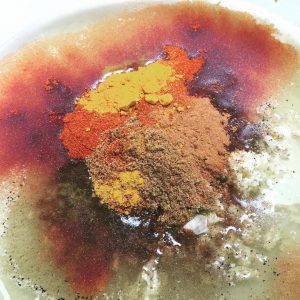Cooking And Writing
 I’m at one of those spots in my book where I’ve made a wrong turn somewhere, and I don’t quite know what the mistake is. Maybe a character did something wrong. Maybe a scene has veered off-track. Maybe a backstory bit that’s not going to work with the emerging story.
I’m at one of those spots in my book where I’ve made a wrong turn somewhere, and I don’t quite know what the mistake is. Maybe a character did something wrong. Maybe a scene has veered off-track. Maybe a backstory bit that’s not going to work with the emerging story.
Something. And until I figure it out, the muses are not going to give permission to move forward.
It’s a late spring day, brilliant sunshine streaming out of a pristine blue sky. My irises have gone mad, every single flower a showy wonder of ruffled perfection, and the poppies are exploding from their cases with wanton abandon. Every animal and insect in the natural world is outside, calling to lovers, feeding their young, generally engaging in the orgy of spring.
I am inside, cooking. Yesterday it was rose petal jam, made from a recipe in a cooking memoir I loved, Shared Tables, by Kaumudi Marathe. The image of the jelly entranced me, and now the jar sits on the window sill, distilling light into pale pink cubes.
Today’s effort is one of my recent favorites, an oven-roasted chicken shawarma. I love making the marinade, the beauty and the multitude of spices, the artistic splashes they make together in the glass bowl—tumeric and paprika, fresh ground pepper and kosher salt, a solid, heady helping of cumin, all spreading in a swirl across the surface of the olive oil. I love mincing garlic—at least six cloves crushed, then peeled, then finely minced.
I’m cooking.
I’m writing.
It’s too hot to be cooking like this, really. Even with a box fan blowing on me from the doorway, I am sweating and uncomfortable. It doesn’t matter. This is how I make a book.
It also doesn’t matter what I cook. It could just as well be a mole, or a long-stewing red sauce, or an elaborate soup that requires the
chopping of many vegetables.
When my partner comes in and sees the multitude of spices and onion skins strewn across the counter, he knows why. “Trouble with the writing?”
I sigh.
I am not a writer who gets blocked. I don’t actually believe in it. My roots are in journalism, which rids you quickly of any preciousness you might have over your writing. I learned to write fresh paragraphs at three in the morning or when I was bone-tired or even when I hated my subject. It’s not easy writing, but it can be done.
What the practice of journalism teaches is that the writing done under duress, or when I didn’t feel like it, or when I was totally wiped out, was pretty much the same kind of writing I did when I was excited and energized. I learned, essentially, to trust the act of writing.
But there are times, like today, when I get a little bit stuck. Sometimes I can reread and figure it out, but mostly I have to walk away.
Walk as far as the kitchen, that is. Cooking is like driving and showering—the repetitive, mindless tasks create a perfect stage for working out problems.
It turns out there is science behind this. A study out of the University of California, Santa Barbara tells us, “History is rich with ‘eureka’ moments: scientists from Archimedes to Isaac Newton and Albert Einstein are said to have had flashes of inspiration while thinking about other things. But the mechanisms behind this psychological phenomenon have remained unclear. A study now suggests that simply taking a break does not bring on inspiration — rather, creativity is fostered by tasks that allow the mind to wander.”
So it’s no surprise, from a scientific point of view, that I turn to cooking when I want to foster creativity. It’s mindful and meditative. It makes me look, see, touch. This onion, this big red onion, was planted in a field, and grew into a seedling, and was watered by rain and heated by the sun until it was large enough to be harvested. It was plucked out of the ground by hand or a machine, and bundled into boxes that were driven to my local store, where I tested examined it for wounds and weight, and put it in my basket and brought it home to take out and cut into quarters for shawarma.
 Meanwhile, the creative mind is freed to toss around ideas and rearrange the furniture of my book without me fretting and nixing every idea before it even has a chance. Because I’m not actually sitting at the computer, I don’t feel like I’m working. As I focus on slicing green onions just so, my mind is occupied with the physical world—peel away the outer layer, chop off the tiny roots, slice evenly into rounds. I peel a cucumber for riata and twist fresh coriander leaves so that I can cut them into tiny, fresh ribbons of flavor.
Meanwhile, the creative mind is freed to toss around ideas and rearrange the furniture of my book without me fretting and nixing every idea before it even has a chance. Because I’m not actually sitting at the computer, I don’t feel like I’m working. As I focus on slicing green onions just so, my mind is occupied with the physical world—peel away the outer layer, chop off the tiny roots, slice evenly into rounds. I peel a cucumber for riata and twist fresh coriander leaves so that I can cut them into tiny, fresh ribbons of flavor.
Meanwhile, my muses wander the halls of my brain, peeking into dusty rooms, gathering up snippets of memory and calling back that day on the beach when I practiced yoga in the sand, alone in the dawn magic. They shop in the aisle of Ideas Discarded, and hurry back with a box of things they’ll share with the others, and eventually…me.
As I chop, taste, stir, the girls in the basement, my muses, toss plot points back and forth, in sharp whispers. Why did he do that? Where was she when that happened? What’s missing. What about…..”
At last, they deliver the answer I had been seeking—so obvious, now. Of course that’s what it is.
I slide the shwarma into the oven and head back to the page, ready to write.
—
Barbara O’Neal is the author of eleven novels of women’s fiction, including How to Bake a Perfect Life and The Lost Recipe for Happiness. Her award-winning books have been published in more than a dozen countries, including France, England, Poland, Australia, Turkey, Italy, Germany, and Brazil. She lives in the beautiful city of Colorado Springs with her beloved, a British endurance athlete who vows he’ll never lose his accent.
Follow her on Facebook https://www.facebook.com/BarbaraSamuelONeal
Twitter https://twitter.com/barbaraoneal
Website https://twitter.com/barbaraoneal
THE ART OF INHERITING SECRETS
 When Olivia Shaw’s mother dies, the sophisticated food editor is astonished to learn she’s inherited a centuries-old English estate—and a title to go with it. Raw with grief and reeling from the knowledge that her reserved mother hid something so momentous, Olivia leaves San Francisco and crosses the pond to unravel the mystery of a lifetime.
When Olivia Shaw’s mother dies, the sophisticated food editor is astonished to learn she’s inherited a centuries-old English estate—and a title to go with it. Raw with grief and reeling from the knowledge that her reserved mother hid something so momentous, Olivia leaves San Francisco and crosses the pond to unravel the mystery of a lifetime.
One glance at the breathtaking Rosemere Priory and Olivia understands why the manor, magnificent even in disrepair, was the subject of her mother’s exquisite paintings. What she doesn’t understand is why her mother never mentioned it to her. As Olivia begins digging into her mother’s past, she discovers that the peeling wallpaper, debris-laden halls, and ceiling-high Elizabethan windows covered in lush green vines hide unimaginable secrets.
Although personal problems and her life back home beckon, Olivia finds herself falling for the charming English village and its residents. But before she can decide what Rosemere’s and her own future hold, Olivia must first untangle the secrets of her past.
BUY THE BOOK HERE
Category: Contemporary Women Writers, How To and Tips
























